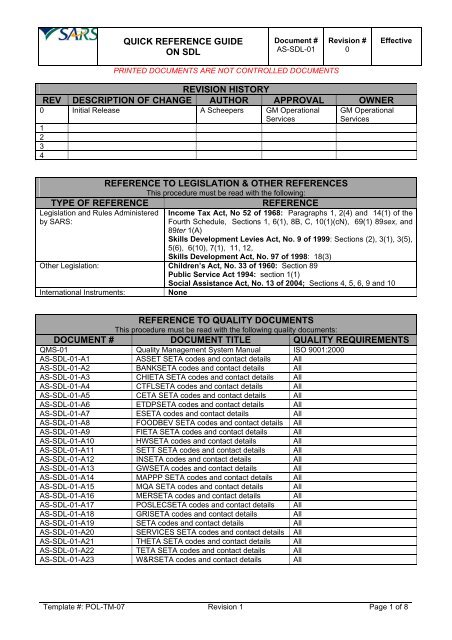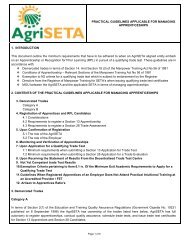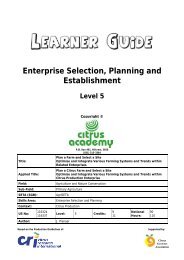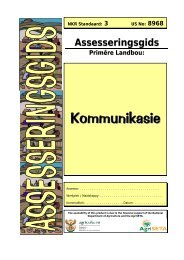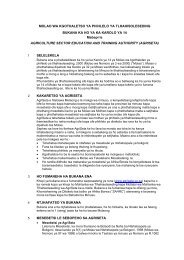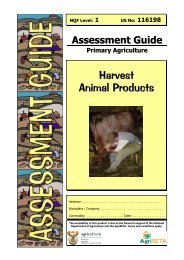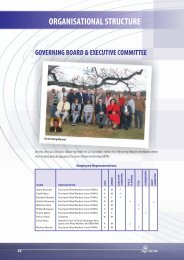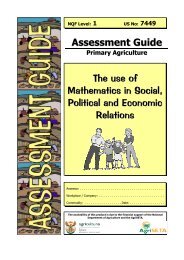QUICK REFERENCE GUIDE ON SDL REVISION ... - AgriSETA
QUICK REFERENCE GUIDE ON SDL REVISION ... - AgriSETA
QUICK REFERENCE GUIDE ON SDL REVISION ... - AgriSETA
You also want an ePaper? Increase the reach of your titles
YUMPU automatically turns print PDFs into web optimized ePapers that Google loves.
<strong>QUICK</strong> <strong>REFERENCE</strong> <strong>GUIDE</strong><br />
<strong>ON</strong> <strong>SDL</strong><br />
Document #<br />
AS-<strong>SDL</strong>-01<br />
Revision #<br />
0<br />
Effective<br />
PRINTED DOCUMENTS ARE NOT C<strong>ON</strong>TROLLED DOCUMENTS<br />
REVISI<strong>ON</strong> HISTORY<br />
REV DESCRIPTI<strong>ON</strong> OF CHANGE AUTHOR APPROVAL OWNER<br />
0 Initial Release A Scheepers GM Operational<br />
Services<br />
GM Operational<br />
Services<br />
1<br />
2<br />
3<br />
4<br />
TYPE OF <strong>REFERENCE</strong><br />
Legislation and Rules Administered<br />
by SARS:<br />
<strong>REFERENCE</strong> TO LEGISLATI<strong>ON</strong> & OTHER <strong>REFERENCE</strong>S<br />
This procedure must be read with the following:<br />
<strong>REFERENCE</strong><br />
Income Tax Act, No 52 of 1968: Paragraphs 1, 2(4) and 14(1) of the<br />
Fourth Schedule, Sections 1, 6(1), 8B, C, 10(1)(cN), 69(1) 89sex, and<br />
89ter 1(A)<br />
Skills Development Levies Act, No. 9 of 1999: Sections (2), 3(1), 3(5),<br />
5(6), 6(10), 7(1), 11, 12,<br />
Skills Development Act, No. 97 of 1998: 18(3)<br />
Other Legislation: Children’s Act, No. 33 of 1960: Section 89<br />
Public Service Act 1994: section 1(1)<br />
International Instruments:<br />
Social Assistance Act, No. 13 of 2004; Sections 4, 5, 6, 9 and 10<br />
None<br />
<strong>REFERENCE</strong> TO QUALITY DOCUMENTS<br />
This procedure must be read with the following quality documents:<br />
DOCUMENT # DOCUMENT TITLE QUALITY REQUIREMENTS<br />
QMS-01 Quality Management System Manual ISO 9001:2000<br />
AS-<strong>SDL</strong>-01-A1 ASSET SETA codes and contact details All<br />
AS-<strong>SDL</strong>-01-A2 BANKSETA codes and contact details All<br />
AS-<strong>SDL</strong>-01-A3 CHIETA SETA codes and contact details All<br />
AS-<strong>SDL</strong>-01-A4 CTFLSETA codes and contact details All<br />
AS-<strong>SDL</strong>-01-A5 CETA SETA codes and contact details All<br />
AS-<strong>SDL</strong>-01-A6 ETDPSETA codes and contact details All<br />
AS-<strong>SDL</strong>-01-A7 ESETA codes and contact details All<br />
AS-<strong>SDL</strong>-01-A8 FOODBEV SETA codes and contact details All<br />
AS-<strong>SDL</strong>-01-A9 FIETA SETA codes and contact details All<br />
AS-<strong>SDL</strong>-01-A10 HWSETA codes and contact details All<br />
AS-<strong>SDL</strong>-01-A11 SETT SETA codes and contact details All<br />
AS-<strong>SDL</strong>-01-A12 INSETA codes and contact details All<br />
AS-<strong>SDL</strong>-01-A13 GWSETA codes and contact details All<br />
AS-<strong>SDL</strong>-01-A14 MAPPP SETA codes and contact details All<br />
AS-<strong>SDL</strong>-01-A15 MQA SETA codes and contact details All<br />
AS-<strong>SDL</strong>-01-A16 MERSETA codes and contact details All<br />
AS-<strong>SDL</strong>-01-A17 POSLECSETA codes and contact details All<br />
AS-<strong>SDL</strong>-01-A18 GRISETA codes and contact details All<br />
AS-<strong>SDL</strong>-01-A19 SETA codes and contact details All<br />
AS-<strong>SDL</strong>-01-A20 SERVICES SETA codes and contact details All<br />
AS-<strong>SDL</strong>-01-A21 THETA SETA codes and contact details All<br />
AS-<strong>SDL</strong>-01-A22 TETA SETA codes and contact details All<br />
AS-<strong>SDL</strong>-01-A23 W&RSETA codes and contact details All<br />
Template #: POL-TM-07 Revision 1 Page 1 of 8
<strong>QUICK</strong> <strong>REFERENCE</strong> <strong>GUIDE</strong><br />
<strong>ON</strong> <strong>SDL</strong><br />
Document #<br />
AS-<strong>SDL</strong>-01<br />
Revision #<br />
0<br />
Effective<br />
1 PURPOSE<br />
PRINTED DOCUMENTS ARE NOT C<strong>ON</strong>TROLLED DOCUMENTS<br />
These guidelines have been compiled to assist employers in understanding the basic fundamentals of the<br />
Skills Development Levies Act and must be read in conjunction with the Income Tax Act.<br />
2 SCOPE<br />
• This basic guide explains the legislative requirements applicable to employers for the deductions<br />
relating to Skills Development Levy contributions.<br />
• In the event of this guide not providing a solution to any problem relating to the registration, calculating<br />
and payment of the levy, your local SARS office should be approached for assistance.<br />
3 DEFINITI<strong>ON</strong>S AND ACR<strong>ON</strong>YMS<br />
n.e.c<br />
PAYE<br />
SARS<br />
SETA<br />
<strong>SDL</strong><br />
SIC<br />
Not elsewhere classified<br />
Pay-as-you-earn<br />
South African Revenue Service<br />
Sector Education and Training Authority<br />
Skills Development Levy<br />
Standard Industrial Classification Code<br />
4 BACKGROUND<br />
• The Skills Development Levies Act, No. 9 of 1999 established a compulsory levy scheme for the<br />
purpose of funding education and training as envisaged in the Skills Development Act, No. 97 of 1998.<br />
The Skills Development Levies Act came into operation on 1 September 1999 and the levy became<br />
payable with effect from 1 April 2000.<br />
• The Department of Labour in conjunction with the various SETA’s is responsible for the administation<br />
of the Skill Development Act No. 97 of 1998. Any enquiries regarding the levy grant scheme must<br />
therefore be referred to the relevant SETA or the Department of Labour<br />
• The Commissioner for the South African Revenue Service is responsible for administrating the Skills<br />
Development Levies Act in so far as it relates to the collection and the payment of the levy by<br />
employers to the Commissioner.<br />
5 GOVERNING LEGISLATI<strong>ON</strong><br />
The paragraphs of the Fourth Schedule referred to in this publication are governed by the Income Tax Act<br />
and the sections are governed by the Skills Development Levies Act. References to sections governed by<br />
the Income Tax Act are specifically indicated.<br />
6 WHO PAYS SKILLS DEVELOPMENT LEVIES<br />
• An employer (Paragraph 1 of the Fourth Schedule and Section 1 of the Skills Development Levies Act)<br />
who pays or is liable to pay a person an amount by way of remuneration, including a person<br />
remunerated under the provisions of a law or out of public funds or out of funds voted by Parliament or<br />
Provincial Council.<br />
• A representative employer (Paragraph 1 of the Fourth Schedule) is any public officer, liquidator,<br />
judicial manager, manager, secretary, officer, guardian, curator, administrator or other person having<br />
authority to pay remuneration on behalf of an employer.<br />
Template #: POL-TM-07 Revision 1 Page 2 of 8
<strong>QUICK</strong> <strong>REFERENCE</strong> <strong>GUIDE</strong><br />
<strong>ON</strong> <strong>SDL</strong><br />
Document #<br />
AS-<strong>SDL</strong>-01<br />
Revision #<br />
0<br />
Effective<br />
PRINTED DOCUMENTS ARE NOT C<strong>ON</strong>TROLLED DOCUMENTS<br />
• The representative employer is subject to the same duties, responsibilities and liabilities as the<br />
employer.<br />
7 WHICH EMPLOYERS ARE EXEMPT FROM PAYING THE LEVY<br />
• Any public service employer in the national or provincial sphere of government. (These employers<br />
must budget for an amount equal to the levies payable for training and education of their employees).<br />
• Any national or provincial public entity if 80% or more of its expenditure is paid directly or indirectly<br />
from funds voted by Parliament. (These employers must budget for an amount equal to the levies<br />
payable for the training and education of their employees).<br />
• Any public benefit organisation which is exempt from the payment of income tax in terms of section<br />
10(1)(cN) of the Income Tax Act which solely carries on welfare and humanitarian, certain health care<br />
and religious belief or philosophy public benefit activities which solely provides funds to such public<br />
benefit organisation.<br />
• Any municipality in respect of which a certificate of exemption has been issued by the Minister of<br />
Labour.<br />
• Any employer where the total leviable amount of all its employees over the next 12 months will not<br />
exceed R500 000.<br />
• Although the above-mentioned employers are exempt from the payment of the levy, these employers<br />
(excluding the employer where the leviable amount does not exceed R500 000) are NOT absolved<br />
from registration in terms of section 5(6) of the Skills Development Levies Act. (Refer to paragraph 10<br />
relating to registration.)<br />
8 WHAT IS REMUNERATI<strong>ON</strong><br />
• Paragraph 1 of the Fourth Schedule to the Income Tax Act, defines “remuneration” as any amount of<br />
income which is paid or is payable to any person whether in cash or otherwise and whether or not in<br />
respect of services rendered for example –<br />
<br />
<br />
<br />
<br />
<br />
<br />
<br />
<br />
<br />
<br />
<br />
<br />
<br />
<br />
<br />
Salary;<br />
Remuneration for overtime;<br />
Fees;<br />
Leave gratuity;<br />
Emolument;<br />
Allowance;<br />
Bonus;<br />
Gratuity;<br />
Wage;<br />
Commission;<br />
Stipend;<br />
Voluntary award;<br />
Lump sum payment;<br />
Directors remuneration;<br />
An amount received or accrued in commutation of an amount due in terms of a contract or<br />
employment or service;<br />
Template #: POL-TM-07 Revision 1 Page 3 of 8
<strong>QUICK</strong> <strong>REFERENCE</strong> <strong>GUIDE</strong><br />
<strong>ON</strong> <strong>SDL</strong><br />
Document #<br />
AS-<strong>SDL</strong>-01<br />
Revision #<br />
0<br />
Effective<br />
<br />
<br />
<br />
<br />
<br />
<br />
<br />
PRINTED DOCUMENTS ARE NOT C<strong>ON</strong>TROLLED DOCUMENTS<br />
An amount received or accrued in respect of the relinquishment, termination, loss, repudiation,<br />
cancellation or variation of an office or employment of an appointment;<br />
50% of an allowance paid or advance given to an employee or holder of a public office in<br />
respect of the expense of traveling for business purposes (excluding an allowance paid for<br />
actual distance traveled not exceeding the rate per kilometer fixed by the Minister of Finance in<br />
the Government Gazette);<br />
50% of an allowance paid to a holder of a public office;<br />
Fringe benefits received in terms of the Seventh Schedule to the Income Tax Act;<br />
A gratuity received or accrued to a person from his / her employer because such person<br />
obtained a university degree or diploma or was successful in an examination;<br />
The market value of any qualifying equity share contemplated in section 8B, determined on the<br />
date of disposal, which has been disposed of by the employee and where the receipts and<br />
accruals from that disposal must be included in the employee’s income; and<br />
Any gain determined in terms of section 8C which is required to be included in the income of an<br />
employee.<br />
• Amounts excluded from remuneration –<br />
<br />
<br />
<br />
<br />
Independent contractors who are not subject to control or supervision of any person as to the<br />
manner in which their duties are performed, the hours of work or if the amounts paid or payable<br />
to them are not payable at regular (daily, weekly, monthly or other) intervals.<br />
Any pension or allowance in terms of any of the following Acts:<br />
o Children’s Act, No. 33 of 1960;<br />
o Public Service Act 1994; and<br />
o Social Assistance Act, No. 13 of 2004.<br />
Amounts paid to an employee to reimburse the employee for actual business expenses incurred<br />
in the course of his / her employment.<br />
Any allowance or advance in terms of an order of divorce or decree of judicial separation or<br />
under any agreement of separation.<br />
9 LEVIABLE AMOUNT<br />
• The total amount of remuneration paid or payable, or deemed to be paid or payable, by an employer<br />
to its employees during any month, as determined for the purposes of determining employees’ tax in<br />
terms of the Fourth Schedule to the Income Tax Act, whether or not such employer is liable to deduct<br />
or withhold such employees’ tax.<br />
• Remuneration paid to employees below the income tax threshold (i.e. in those cases where no<br />
employees’ tax is deducted) must be incorporated into the remuneration for determining the leviable<br />
amount.<br />
• The remuneration paid / payable to directors of private companies (including members of close<br />
corporations) must also be included when calculating the leviable amount. The amount must be<br />
calculated by using the actual remuneration of the director.<br />
• Amounts excluded in determining the leviable amount –<br />
<br />
Section 3(5) of the Skills Development Levies Act stipulates that the following amounts must be<br />
excluded for purposes of determining the leviable amount -<br />
o An amount paid or payable to any labour broker or any person declared by the Minister of<br />
Finance by notice in the Government Gazette as an employee AND to whom a certificate<br />
of exemption has been issued by the Commissioner for the South African Revenue<br />
Service (SARS).<br />
o An amount paid or payable to any person by way of any pension, superannuating allowance<br />
or retiring allowance.<br />
Template #: POL-TM-07 Revision 1 Page 4 of 8
<strong>QUICK</strong> <strong>REFERENCE</strong> <strong>GUIDE</strong><br />
<strong>ON</strong> <strong>SDL</strong><br />
Document #<br />
AS-<strong>SDL</strong>-01<br />
Revision #<br />
0<br />
Effective<br />
<br />
PRINTED DOCUMENTS ARE NOT C<strong>ON</strong>TROLLED DOCUMENTS<br />
o An amount contemplated in paragraphs (a), (d), (e) or (eA) of the definition of “gross income”<br />
in section 1 of the Income Tax Act. In essence this pertains to -<br />
• annuity payments;<br />
• any amount, including a voluntary award received or accrued in respect of the<br />
relinquishment, termination, loss, repudiation, cancellation or variation of an office or<br />
employment or of any appointment, e.g. retrenchment payment; and<br />
• lump sum payments from pension, provident and retirement annuity funds.<br />
An amount payable to a learner in terms of a contract of employment contemplated in section<br />
18(3) of the Skills Development Act.<br />
• How to determine the leviable amount:<br />
1. Total<br />
Remuneration<br />
2. LESS: PAYE<br />
Exclusions<br />
3. LESS: <strong>SDL</strong><br />
exclusions<br />
4. LESS: Allowable<br />
deductions in<br />
respect of -<br />
Action and Status<br />
• amount paid to an independent contractor;<br />
• reimbursive amounts paid to employees;<br />
• pensions and allowances payable in terms of —<br />
‣ Children’s Act, No. 33 of 1960: Section 89<br />
‣ Social Assistance Act, No. 13 of 2004: Sections 4, 5, 6, 9 and 10<br />
• allowances or advances in terms of an order of divorce or decree of<br />
judicial agreement of separation.<br />
• Amounts payable to labour brokers who are in possession of a valid<br />
exemption certificate;<br />
• Amounts payable by way of any pension, superannuating allowance or<br />
retiring allowance;<br />
• Annuities;<br />
• Lump sum payments from employers (gratuities);<br />
• Lump sum payments from any fund; and<br />
• Amounts paid to a learner in terms of the Skills Development Levies<br />
Act.<br />
• Current and arrear contributions to approved pension and retirement<br />
annuity funds;<br />
• Medical aid contributions in case of an employee who is 65 years or<br />
older; and<br />
• Income protection policy premiums.<br />
Authority<br />
Par. 1 of the Fourth Schedule<br />
definition: “remuneration”<br />
Par. 1 of the Fourth Schedule<br />
definition: “remuneration”<br />
Sect. 3(5) of the Skills<br />
Development Levies Act<br />
Par. 2(4) & Par. 1 of the<br />
Fourth Schedule, definition:<br />
“net remuneration”<br />
5. Leviable amount X prescribed percentage Sec. 3(1) of the <strong>SDL</strong> Levies<br />
Act.<br />
10 REGISTRATI<strong>ON</strong> FOR PAYMENT OF SKILLS DEVELOPMENT LEVY<br />
(Section 5(1) and (2) of the Skills Development Levies Act)<br />
• Where an employer is liable to pay the levy he / she must register per EMP 101 (Application for<br />
Registration) as an employer with the SARS office in which area the business is situated and indicate<br />
thereon the jurisdiction of the SETA within which the employer must be classified as well as the SIC<br />
code (refer to the annexes for the applicable SETA codes).<br />
• Important: Although certain employers are exempt from paying skills development levy, they are<br />
NOT absolved from registration in terms of section 5(6) of the Skills Development Levies Act. In other<br />
words the employer must still register per EMP 101 form (Application for Registration). However, any<br />
employer who, during any month, within reasonable grounds believes that the total leviable amount<br />
paid or payable to his / her employees during the following 12 month period will not exceed R500 000<br />
is absolved from registration. (Refer to paragraph 7 relating to exemptions.)<br />
11 PAYMENT OF LEVY<br />
• Section 3(1) and (4) of the Skills Development Levies Act prescribes that the employer must pay a<br />
skills development levy of –<br />
0,5% of the leviable amount for 1 April 2000 to 31 March 2001; and<br />
1% of the leviable amount from 1 April 2001.<br />
Template #: POL-TM-07 Revision 1 Page 5 of 8
<strong>QUICK</strong> <strong>REFERENCE</strong> <strong>GUIDE</strong><br />
<strong>ON</strong> <strong>SDL</strong><br />
Document #<br />
AS-<strong>SDL</strong>-01<br />
Revision #<br />
0<br />
Effective<br />
• Method of payments –<br />
PRINTED DOCUMENTS ARE NOT C<strong>ON</strong>TROLLED DOCUMENTS<br />
<br />
<br />
<br />
Payment via eFiling: eFiling is a free of charge secure electronic tax return and payment<br />
submission service offered by SARS. SARS eFiling provides various enhanced payment<br />
solutions available for most of the major banks. For more information go to<br />
www.sarsefiling.co.za.<br />
Electronic payments via the internet: Electronic payments can be made directly into SARS<br />
banking accounts via Internet bank facilities. It is however imperative that exactly the same<br />
reference number which is reflected on the monthly return (EMP 201) is provided / used to<br />
ensure that the tax payments can be identified and correctly allocated upon receipt by SARS to<br />
ensure that the payments are processed correctly to the correct tax type, there are two items,<br />
which are essential namely -<br />
o the19-digit bank payment reference number; and<br />
o the SARS bank account number.<br />
The following table lists the relevant tax type, bank account and date reference for the purposes<br />
of compiling the 19-digit reference number:<br />
Reference Number Tax Type Date format Bank Account<br />
Indicator<br />
LXX07XXXXX G 00mmyyyy 620 13984291<br />
X refers to a digit from 0 – 9.<br />
The 19-digit reference number is made up as follows –<br />
10 digits 1 digit 8 digits<br />
[tax type reference number] [tax type indicator] [tax period being paid]<br />
This number ensures that the<br />
payment will be credited to the<br />
taxpayer’s tax account. This<br />
reference number is allocated by<br />
SARS with registration, for<br />
example the number starting with<br />
“L” is for <strong>SDL</strong>.<br />
This alpha character will<br />
vary depending on the type<br />
of tax being paid, for<br />
example, “G” is for Skills<br />
Development Levy.<br />
The last 8 digits refer to the<br />
period for which the payment is<br />
being made. The date format<br />
used is 00mmyyyy. The<br />
particular date used is dependant<br />
on the month for which the tax is<br />
paid. For <strong>SDL</strong>, only the month<br />
and year are required. In this<br />
instance the first two digits of the<br />
date format must be “00”.<br />
<br />
<br />
Payments exceeding bank limits: The banks have set limits on cheques, ATM transactions<br />
and electronic payments. These limits are as follows –<br />
o Cheque payments to SARS may not exceed R5 million. Should a cheque exceeding this<br />
amount be issued, it will be returned and penalties and interest as a result of late payment<br />
will be incurred.<br />
o EFT payments in excess of R5 million must be cleared with your banker.<br />
o eFiling transactions will not be affected by these new rules as no limits are imposed<br />
thereon.<br />
Should your existing payment method exceed any of these limits, you must approach your bank<br />
in a timely fashion in order to ensure electronic transfer of funds or a real time transaction if<br />
necessary.<br />
Payment at FNB or ABSA bank: Any payment made at FNB or ABSA must comply with<br />
exactly the same payment referencing requirements as internet payments. The following<br />
information is required by FNB / ABSA in order to accept and process SARS payments -<br />
o SARS tax form / payment advice;<br />
o A FNB / ABSA deposit slip, completed with the following specific details -<br />
• The bank branch code is 253145;<br />
Template #: POL-TM-07 Revision 1 Page 6 of 8
<strong>QUICK</strong> <strong>REFERENCE</strong> <strong>GUIDE</strong><br />
<strong>ON</strong> <strong>SDL</strong><br />
Document #<br />
AS-<strong>SDL</strong>-01<br />
Revision #<br />
0<br />
Effective<br />
<br />
PRINTED DOCUMENTS ARE NOT C<strong>ON</strong>TROLLED DOCUMENTS<br />
• The bank account number - each tax type has a different bank account into which<br />
payment must be made, 620 13984291 in the case of <strong>SDL</strong>;<br />
• A 19-digit bank payment reference number which complies with the requirements, as<br />
shown above; and<br />
• The amount due.<br />
In order for SARS to process your payment accurately and timely it is of vital importance that<br />
the deposit slip contains all the correct information. The bank will reject all payments which do<br />
not comply with the payment reference criteria listed above.<br />
Payment at SARS office: Payment can be made during office hours at any SARS Revenue<br />
office. For ease of processing, taxpayers should ensure that the return / payment advice is<br />
attached to all payments indicating the taxpayer’s reference number, tax type and tax period.<br />
Due date for payments –<br />
o Sections 6(1) & (2) and 7(1) & (4) of the Skills Development Levies Act and Section 89sex of<br />
the Income Tax Act prescribe that the levy must be paid over to SARS not later than 7 days<br />
after the end of the month in respect of which the levy is payable under cover of a completed<br />
EMP 201 return.<br />
<br />
<br />
<br />
Exception: Where the 7th day after the end of the month for which the levy is payable falls on<br />
a Saturday, Sunday or Public holiday, such payment must be made not later than the last<br />
business day prior to such Saturday, Sunday or Public holiday.<br />
Payment must be made on the prescribed EMP 201 return, which will be posted to registered<br />
employers each month for this purpose. However, only in cases where the employer did not<br />
received the return in time for payment, he / she must attach a note to his / her payment<br />
stating —<br />
o Name, postal address and contact telephone number of employer;<br />
o Reference number, starting with a L;<br />
o Month to which the payment relates (e.g. April 2005);<br />
o Total leviable amount;<br />
o The amount of payment enclosed; and<br />
o The number of employees whose remuneration was included in the leviable amount.<br />
The fact that an employer does not receive an EMP 201 return at all will not be accepted as an<br />
excuse for the late payment of the levy.<br />
• Allocation of payment –<br />
Where any payment is made by an employer in respect of employees’ tax, such payment will be<br />
allocated in the following order -<br />
o in respect of penalty;<br />
o in respect of interest, to the extent to which the payment exceeds the amount of penalty;<br />
o in respect of employees’ tax or additional penalty, to the extent to which the payment<br />
exceeds the amount of penalty and interest.<br />
here there is a shortfall after the allocation of penalties and interest and the outstanding tax has<br />
not been covered in full, interest will continue to accrue on the outstanding tax.<br />
12 PENALTIES AND INTEREST<br />
• In terms of sections 11 and 12 of the Skills Development Levies Act and sections 89ter 1(A) of the<br />
Income Tax Act, interest will be charged at the prescribed rates determined by the Minister of Finance<br />
and published periodically, and a penalty equal to 10% of the outstanding amount will be imposed<br />
should the levy not be paid within the prescribed period.<br />
• Additional penalty: An additional penalty, not exceeding an amount equal to twice the amount of<br />
Skills Development Levy may be imposed on the employer where the employer fails to pay the<br />
relevant amount with intent to evade his / her obligation(s) under this Act.<br />
Template #: POL-TM-07 Revision 1 Page 7 of 8
<strong>QUICK</strong> <strong>REFERENCE</strong> <strong>GUIDE</strong><br />
<strong>ON</strong> <strong>SDL</strong><br />
Document #<br />
AS-<strong>SDL</strong>-01<br />
Revision #<br />
0<br />
Effective<br />
PRINTED DOCUMENTS ARE NOT C<strong>ON</strong>TROLLED DOCUMENTS<br />
13 OFFENCES<br />
• With reference to Section 20 of the Skills Development Levies Act any person who -<br />
Fails to apply for registration for the purposes of the levy;<br />
Fails to pay any levy on the date determined for payment thereof;<br />
Furnishes any false information in a statement or other document required in terms of this Act,<br />
knowing the information to be false;<br />
Fails to submit or deliver any statement or other document or thing;<br />
Fails to disclose any information that he / she is obliged to disclose in terms of the Act;<br />
Fails to reply or answer truly and fully any questions put to him / her;<br />
Fails to attend and give evidence required in terms of the Skills Development Levies Act; or<br />
Hinders or obstructs any person in carrying out his / her functions in terms of the Skills<br />
Development Levies Act,<br />
will be guilty of an offence and liable on conviction to a fine or to imprisonment for a period not<br />
exceeding one year.<br />
• In terms of section 75A the Commissioner may, notwithstanding the Secrecy section from time to time<br />
publish for general information the particulars relating to any offence in terms of the Income Tax Act.<br />
• Every such publication may specify the following -<br />
Name and address of the offender;<br />
Such particulars of the offence as the Commissioner may think fit;<br />
Year or period during which the offence occurred;<br />
Amount or estimated amount involved; and / or<br />
Particulars of the fine or sentence imposed.<br />
14 PROCEDURE TO FOLLOW SHOULD AN EMPLOYER FALL WITHIN THE<br />
JURISDICTI<strong>ON</strong> OF MORE THAN <strong>ON</strong>E SETA<br />
• Sections 5(2) and (3) of the Skills Development Levies Act prescribe that where an employer falls<br />
within the jurisdiction of more than one SETA, that employer must select one SETA within which it<br />
must be classified for the purpose of Skills Development Levy after taking the following factors into<br />
consideration -<br />
Composition of its workforce<br />
Amount of remuneration paid or payable to the different categories of employees; and<br />
Training needs of the different categories of employees.<br />
• Any selection undertaken is binding upon the employer unless the Commissioner for the South African<br />
Revenue Service otherwise directs.<br />
15 RECORD KEEPING<br />
• With reference to Section 69(1) of the Income Tax Act and paragraph 14(1) of the Fourth Schedule to<br />
the Income Tax Act records of all the remuneration paid to every employee, as well as the employees’<br />
tax deducted or withheld from the said remuneration and levies paid, must be kept / maintained.<br />
• These records must be kept for a period of 5 years from the date of the last entry and must be<br />
available for inspection purposes by SARS and / or the Department of Labour.<br />
• The provisions of the Income Tax Act is applicable to Skills Development Levy in respect of -<br />
The administration thereof;<br />
Returns, the production of information, documents or things, enquiries, searches and seizure<br />
and evidence under oath;<br />
Assessments, objections and appeals;<br />
The payment, recovery or refund of any contribution, interest and penalty; and<br />
Representative taxpayers and representative employers; etc.<br />
Template #: POL-TM-07 Revision 1 Page 8 of 8


